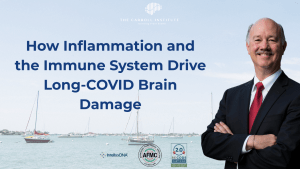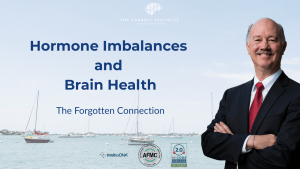Last Updated: October 2025
For decades, most people believed that Alzheimer’s disease and other forms of cognitive decline were simply the result of aging or bad luck. However, groundbreaking research now shows that memory loss and brain fog are not inevitable. In fact, the majority of cognitive decline stems from identifiable—and reversible—root causes. At The Carroll Institute in Sarasota, Dr. Garland Glenn, DC, PhD, AFMC helps patients uncover and correct these underlying factors through the Bredesen ReCODE Protocol and Functional Neurology, two evidence-based approaches designed to restore and protect brain function.
Why Root Causes Matter More Than Labels
In traditional medicine, memory loss is often labeled as “Alzheimer’s,” “mild cognitive impairment,” or simply “getting older.” While these terms describe the symptoms, they don’t explain why the brain is struggling. At The Carroll Institute, we focus on the root causes—biochemical, metabolic, and environmental factors that disrupt how neurons communicate and repair themselves. By identifying these causes, we can target the processes that actually drive decline instead of only managing symptoms.
Dr. Dale Bredesen’s research, published in multiple peer-reviewed journals (NIH), has identified more than 40 distinct contributors to cognitive decline. These fall into several broad categories: inflammation, toxicity, infections, nutrient and hormone imbalances, mitochondrial dysfunction, and metabolic stress. Once corrected, the brain can often stabilize—and even improve—its function.
The Six Major Root Causes of Cognitive Decline
1. Chronic Inflammation: The Fire Inside the Brain
Inflammation is the body’s natural defense mechanism, but when it becomes chronic, it damages neurons and disrupts signaling. Conditions like autoimmune disease, food sensitivities, and leaky gut can all trigger neuroinflammation. Over time, this “silent fire” leads to brain fog, depression, and memory problems. Addressing inflammation through anti-inflammatory nutrition, gut repair, and lifestyle changes is a key step toward recovery. Learn more in Inflammation and the Inflamed Brain.
2. Toxins, Mold, and Heavy Metals: Environmental Burdens
We are exposed to hundreds of environmental toxins daily—from household chemicals to airborne mold spores and heavy metals. These toxins can cross the blood-brain barrier, damage mitochondria, and inflame the nervous system. Functional testing helps identify biotoxin exposure and heavy metal accumulation so that safe detoxification can begin. Learn more in Toxins and Brain Decline.
3. Gut Health and the Microbiome: When the Gut Talks to the Brain
The gut and brain are connected by the vagus nerve and by immune and hormonal signaling. When the gut microbiome becomes unbalanced—due to diet, antibiotics, or chronic stress—the resulting inflammation and leaky gut can trigger “leaky brain.” Research links gut dysbiosis to depression, anxiety, and dementia. Healing the gut is essential for calming the brain. Read more in The Gut-Brain Connection.
4. Hormone and Thyroid Imbalances
Hormones such as thyroid, estrogen, testosterone, and cortisol directly influence brain performance. Low thyroid function or poor thyroid conversion, as seen in Hashimoto’s, can slow cognition. Similarly, declining sex hormones and adrenal imbalance reduce neuroprotection. Restoring hormonal balance through functional medicine is often a turning point in cognitive recovery. Learn more in Hormone Imbalances and Brain Health.
5. Metabolic Dysfunction and Insulin Resistance
The brain depends on stable glucose and insulin balance for energy. When insulin resistance develops—often due to high-carb diets and stress—the brain struggles to use fuel efficiently. This “Type 3 Diabetes” model of Alzheimer’s has been well documented in research (NIH, 2023). By stabilizing blood sugar and improving mitochondrial function, brain performance often rebounds. See Blood Sugar and Brain Health.
6. Infections and Immune Activation
Chronic infections—such as Epstein-Barr Virus (EBV), Lyme disease, or mold-related mycotoxins—can keep the immune system in constant overdrive. This continuous inflammation disrupts brain signaling and can mimic or worsen dementia symptoms. Identifying and treating hidden infections is crucial for true neurological recovery. Learn more in Chronic Infections and the Brain.
The Root Cause Testing Process at The Carroll Institute
At The Carroll Institute, Dr. Glenn uses a personalized, data-driven approach to uncover each patient’s unique mix of root causes. This may include advanced testing for inflammation markers, mycotoxins, hormones, micronutrients, and metabolic function. The results are then used to design a custom ReCODE plan that targets every major contributor to brain decline.
In addition, the Institute integrates Functional Neurology to help patients rebuild lost neural pathways while addressing the biological reasons they were lost in the first place. This combination—repairing the hardware while retraining the software—creates the best possible foundation for lasting cognitive health.
Can Root Cause Treatment Really Reverse Cognitive Decline?
Yes, it can. Multiple peer-reviewed studies show that addressing root causes through precision medicine can significantly improve cognition. In Bredesen’s published trials, over 80% of patients showed measurable improvement after nine months of treatment. The earlier intervention begins, the greater the potential for recovery.
Take the First Step Toward Brain Restoration
If you or a loved one are experiencing brain fog, memory loss, or early cognitive changes, there is hope. The key is finding out why it’s happening—and addressing the root causes before permanent damage occurs. Book a Discovery Call with The Carroll Institute to begin a comprehensive brain health evaluation and personalized recovery plan.
Sources
- Reversal of Cognitive Decline: A Novel Therapeutic Program — NIH (2014)
- Precision Medicine Approach to Alzheimer’s Disease — NIH (2023)
- Rationale for a Multifactorial Approach — NIH (2022)
- Setting the Record Straight: Yes, Cognitive Decline Can Be Reversed — Apollo Health
Medically reviewed by Dr. Garland Glenn, DC, PhD, AFMC (Advanced Functional Medicine Clinician)
The Carroll Institute — Sarasota, FL
Learn more about Dr. Glenn’s background and credentials: About Dr. Garland Glenn
This content is for educational purposes only and does not replace personalized medical advice.

Dr. Garland Glenn, DC, PhD, IFM, AFMC
Founder & Clinical Director, The Carroll Institute — Sarasota, FL
Dr. Garland Glenn is a board-certified chiropractic physician and functional medicine practitioner specializing in cognitive health, neurodegeneration, and root-cause medicine. Certified as an AFMC (Advanced Functional Medicine Clinician) and Institute for Functional Medicine (IFM) trained, he has also completed over 500 hours of advanced training in Functional Neurology under Dr. Ted Carrick, founder of the Carrick Institute.
At The Carroll Institute, Dr. Glenn leads Sarasota’s only ReCODE-certified Functional Neurology program, helping patients reverse or prevent cognitive decline through the Bredesen ReCODE Protocol, neuroplasticity exercises, and personalized functional medicine care.
Learn more about his background and approach at About Dr. Garland Glenn.
– schedule now –
free discovery call
To help you get started, we offer a free 20-minute Discovery Phone Consultation. During this call, you will be able to talk with one of our Certified Brain Health Coaches about what going on with you or your loved one and find out if we can help. Please review our FAQs prior to scheduling your free call. We look forward to talking with you soon and helping you Save Your Brain.
(yes, it’s totally free!)
ReCODE® is a registered program developed by Dr. Dale Bredesen and licensed through Apollo Health. Dr. Garland Glenn is a certified ReCODE practitioner.



